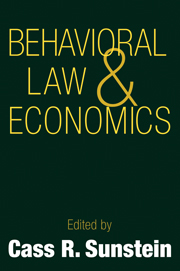Book contents
- Frontmatter
- Contents
- Contributors
- Acknowledgments
- Introduction
- Part I Overview and Prospects
- Part II Heuristics and Biases: Shortcuts, Errors, and Legal Decisions
- 2 Context-Dependence in Legal Decision Making
- 3 A Positive Psychological Theory of Judging in Hindsight
- 4 Behavioral Economics, Contract Formation, and Contract Law
- 5 Organized Illusions: A Behavioral Theory of Why Corporations Mislead Stock Market Investors (and Cause Other Social Harms)
- 6 Reluctance to Vaccinate: Omission Bias and Ambiguity
- 7 Second-Order Decisions
- Part III Valuation: Values and Dollars in the Legal System
- Part IV The Demand for Law: Why Law Is As It Is
- Index
3 - A Positive Psychological Theory of Judging in Hindsight
Published online by Cambridge University Press: 05 June 2012
- Frontmatter
- Contents
- Contributors
- Acknowledgments
- Introduction
- Part I Overview and Prospects
- Part II Heuristics and Biases: Shortcuts, Errors, and Legal Decisions
- 2 Context-Dependence in Legal Decision Making
- 3 A Positive Psychological Theory of Judging in Hindsight
- 4 Behavioral Economics, Contract Formation, and Contract Law
- 5 Organized Illusions: A Behavioral Theory of Why Corporations Mislead Stock Market Investors (and Cause Other Social Harms)
- 6 Reluctance to Vaccinate: Omission Bias and Ambiguity
- 7 Second-Order Decisions
- Part III Valuation: Values and Dollars in the Legal System
- Part IV The Demand for Law: Why Law Is As It Is
- Index
Summary
Nothing is so easy as to be wise after the event.
Everyone is familiar with the feeling that they “knew it all along.” Events, especially tragedies, often feel as if they were predictable. Folk wisdom admonishes us to distrust this sensation. We all know that hindsight vision is “20/20” and that “Monday morning quarterbacking” exaggerates one's ability to know the future. Learning how the story ends makes the outcome seem inevitable, thereby distorting our perception of what could have been predicted. Despite this well-known obstacle to assessing the predictability of events accurately, the law constantly requires courts to make such assessments. Numerous legal judgments, from determining whether a tort defendant failed to take reasonable care to whether a corporate officer committed securities fraud by knowingly making false statements, require that a judge or jury ignore what they have learned in hindsight. If the folk wisdom is correct, these judgments should be distrusted. Our legal system apparently must rely on faulty judgments.
Psychological Research on Judging in Hindsight
The Hindsight Bias
Research by cognitive psychologists supports the folk admonition against trusting judgments made in hindsight. Beginning with the work of Baruch Fischhoff, psychologists have demonstrated repeatedly that people overstate the predictability of past events, a phenomenon that psychologists have termed the “hindsight bias.”
- Type
- Chapter
- Information
- Behavioral Law and Economics , pp. 95 - 115Publisher: Cambridge University PressPrint publication year: 2000
- 15
- Cited by

